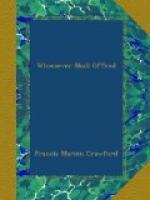“We have had to give you the little room at the end of the cottage,” Corbario was saying to Kalmon. “It is the only one left while the Contessa is here.”
“I should sleep soundly on bare boards to-night,” Kalmon answered. “I have been walking all day.”
Corbario went with him, carrying a candle, and shielding the flame from the breeze with his hand. The room was furnished with the barest necessities, like most country rooms in Italy. There were wooden pegs on which to hang clothes instead of a wardrobe, an iron bedstead, a deal wash-stand, a small deal table, a rush-bottomed chair. The room had only one window, which was also the only door, opening to the floor upon the verandah.
“You can bolt the window, if you like,” said Corbario when he had bidden the Professor good-night, “but there are no thieves about.”
“I always sleep with my windows open,” Kalmon answered, “and I have no valuables.”
“No? Good-night again.”
“Good-night.”
Corbario went out, leaving him the candle, and turned the corner of the verandah. Then he stood still a long time, leaning against one of the wooden pillars and looking out. Perhaps the moonlight falling through the stiff little trees upon the long grass and shrubbery reminded him of some scene familiar long ago. He smiled quietly to himself as he stood there.
Three hours later he was there again, in almost exactly the same attitude. He must have been cold, for the night breeze was stronger, and he wore only his light sleeping clothes and his feet were bare. He shivered a little from time to time, and his face looked very white, for the moon was now high in the heavens and the light fell full upon him. His right hand was tightly closed, as if it held some small object fast, and he was listening intently, first to the right, whence he had come, then to the left, and then he turned his ear towards the trees, through which the path led away towards the hut where the men slept. But there was no sound except the sighing of the wind. The frog by the pool had stopped croaking, and the melancholy cry of the owlet had ceased.
Corbario went softly on, trying the floor of the verandah with his bare feet at each step, lest the boards should creak a little under his weight. He reached the window door of his own room, and slipped into the darkness without noise.
Kalmon cared little for quail-shooting, and as the carriage was going back to Rome he took advantage of it to reach the city, and took his departure about nine o’clock in the morning.
“By the way, how did you sleep?” asked Corbario as he shook hands at parting. “I forgot to ask you.”
“Soundly, thank you,” answered the Professor.
And he drove away, waving his felt hat to his hosts.




